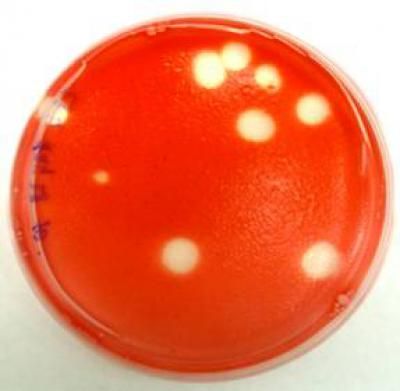'Genetic arms race' between bacteria, viruses subject of stimulus grant
Advertisement
The oceans teem with microscopic bacteria that produce much of Earth's oxygen as they absorb carbon dioxide greenhouse gas. But fast-mutating viruses also populate the seas, attacking marine bacteria in an ages-old evolutionary arms race. A Michigan State University researcher will probe that ancient dynamic against the backdrop of environmental and climate change, and the pivotal role played by aquatic bacteria in maintaining the Earth's biological balance.

These viruses attach a cyanobacteria culture.
Jay Lennon, MSU Kellogg Biological Station
"Even though (viruses) are important for regulating these (bacteria) populations, we find there's a lot of rapid evolution that occurs," said Jay Lennon, an MSU assistant professor of microbiology and molecular genetics. In laboratory settings the organisms known as cyanobacteria can take just weeks to evolve resistance to viruses, Lennon said, while viruses similarly mutate to find new ways to infect them.
Cyanobacteria play a vital role in sequestering ocean nitrogen and phosphorus nutrients, during which they remove carbon dioxide from the air and produce oxygen. Understanding how they evolve to resist viruses could unlock information critical to environmental and climate studies, Lennon said.
Lennon will pursue his research using a $199,000 National Science Foundation grant, including American Recovery and Reinvestment Act funds. He will work with microbiologist Steven Wilhelm of the University of Tennessee and biochemist Nathan VerBerkmoes of Oak Ridge National Laboratory, both funded by other grant amounts.
One of the most common mechanisms for virus resistance is evolutionary change or loss of cell surface receptor molecules – the structures through which viruses enter their hosts. The researchers will study such changes in natural cyanobacteria populations. Lennon will focus on generation of virus-resistant bacterial cell lines and species competition experiments, once key receptors are identified, at his lab at the W.K. Kellogg Biological Station in Hickory Corners, north of Kalamazoo.
Marine viruses have been the subjects of interest only since the late 1980s, Lennon said, and little about how that parasite-host relationship operates is understood. Just a milliliter of seawater can contain up to 10 million viruses, he said, some of which are deadly to some cyanobacterial hosts but not to others. The viruses also could wield substantial influence on global environmental cycles by killing vulnerable cyanobacteria and changing the nature of marine bacterial populations through natural selection, the researchers said.
Earlier research by MSU evolutionary biologist Richard Lenski and others has shown that virus-based natural selection can negatively affect cellular organisms' ability to take in nutrients – that there's a fitness trade-off in bacterial evolution.
























































